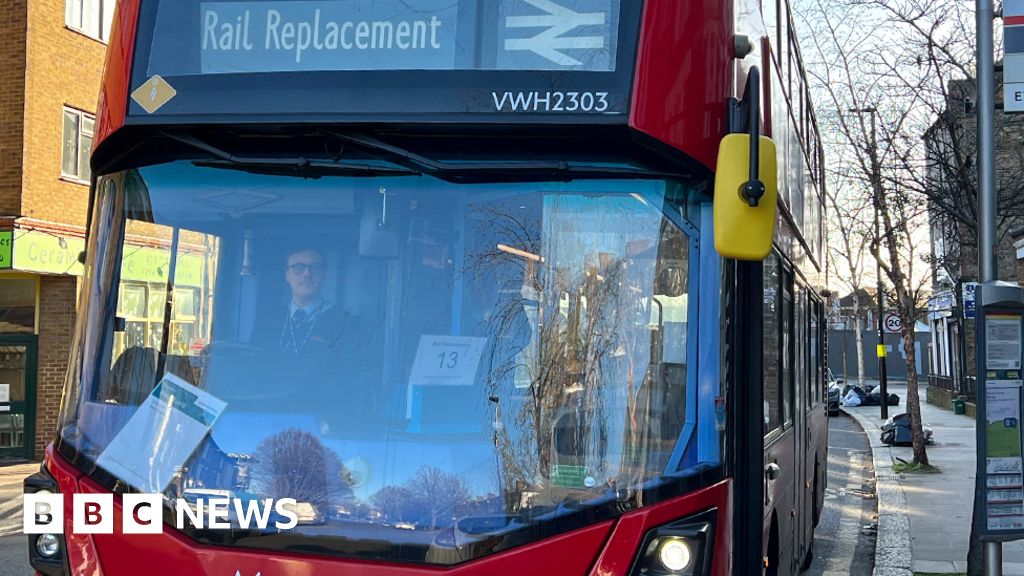Tommy Cooling drives the bus every other Wednesday – even if there is no-one on it
For the past year, a one-way bus service has been running between two places already served by another operator, in order to keep a rail route open. Why?
On a crisp January morning at a bus stop outside West Ealing railway station, a rail replacement service pulls in – one that is thought to be the only one of its kind operating in the UK.
Five passengers, including this intrepid reporter, get on – we already have our tickets as buying one on board is impossible – before the driver announces the only and final stop on the route: West Ruislip.
Unlike the E7 bus, which runs every 12 minutes, this service runs once a week. It takes 25 minutes, six minutes longer than the train it replaced.
As the bus meanders through west London on its eight-mile journey, the top deck offers views of RAF Northolt, a transport hub very much still in use,
So who would actually want to ride this bus?
Sigi Gordon works as a senior conductor on the railway
“Simply put, it’s wacky, it’s different,” says Sigi Gordon, who proudly displays his ticket from this route’s final railway journey in December 2022.
“As a bus enthusiast, it’s something I enjoy and when I have my day off I like travelling and doing different things, so for me, living quite locally anyway, this is something that’s easy and ticks a box. It means you’ve done it.”
There is no advertised timetable, it’s a one-way journey and almost nobody has heard of it, not even people who live nearby.
This is a so-called ghost bus, replacing what is known as a parliamentary train – nicknamed a parly train – a service that rail operators are compelled to offer.
Listen: The journey of a ‘ghost bus’
The terminology dates back to the Railway Regulation Act 1844, which required private companies to provide an affordable minimum service – a penny a mile for a third-class trip – for working people. Companies would often run just a service a day to comply with the legislation.
Chiltern Railways, which is responsible for this route, offers the replacement service because otherwise it would need to go through the drawn-out and expensive process of closing the rail route altogether. It says the bus service “provides weekly quirky journeys for transport enthusiasts and the travelling public”.
With 62 seats and space for a wheelchair user, as well as standing room for another 29 people, does the double-decker ever fill up?
“Some weeks it’s interesting because no-one turns up and you’re driving an empty bus,” says driver Tommy Cooling, who usually works in the schedules department for Metroline, which operates the weekly bus service on behalf of Chiltern Railways.
“Some weeks I have eight people and a BBC crew. No week is the same, every single one is different.
“The uniqueness of being asked to replace a parliamentary train is one of the massive appeals to this and you get so many people who do come out for this and they’re all just so happy to see it.”
Let the train take the strain – or a bus
“People would probably think this is totally bizarre and what a waste of money,” says Roger French, who writes a bus and train blog after a career working in the bus industry.
“But actually running the bus is a hell of a lot cheaper than running the train… because this bus is being run by Metroline in between other work that it does at the peaks, it’s not really costing a bus at all and the driver is one who also works in the office so it’s not really costing a person either.
“It’s being done at what we would call the margin,” Mr French says. Chiltern would not confirm an exact figure but a similar service which ended in 2009 cost a reported £500 a day to operate.
It takes months or even years to close a rail route, Roger French says
A Chiltern Railways spokesperson said: “We are duty-bound to manage industry finances responsibly, and the cost of the parliamentary bus is significantly less than operating the rail journey and training drivers on this route.
“The switch, made at the end of 2022, also allows us to provide additional train-crew resources to our main passenger services between London, Birmingham, Aylesbury and Oxford as demand for our services continues to grow.”
The E7 arrives at the same bus stop every 12 minutes, rather than every seven days
Mr French says he believes the rail replacement service is here to stay.
“It would take months if not years to close a route and I suspect that will never happen,” he adds.
“It’s Britain’s most bizarre railway replacement service because nobody other than people like myself – people interested in buses and trains – would catch it.
“It needs sorting, really.”










